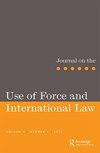安全理事会的作用及其授权使用武力在民主治理话语中创造规范性标志
Q3 Social Sciences
Journal on the Use of Force and International Law
Pub Date : 2022-11-14
DOI:10.1080/20531702.2022.2144433
引用次数: 0
摘要
摘要本文探讨了国际法学者在为一种新的习惯规范的出现而争论时是如何构建论点的。它侧重于学术著作,讨论是否存在一种新的习惯规范,要求国家通过民主统治使其治理合法化。通过将国际法概念化为一套叙事,文章集中于民主治理话语,分析学者们如何将安全理事会的参与作为一种叙事技巧,为他们的论点提供说服力。文章认为,国际律师不断重复对安全理事会参与海地、塞拉利昂和科特迪瓦事务的同样解释,以至于这些案件已成为这种叙述的规范性标志。几篇支持对这些案例进行相同解释的著作的积累,将它们转化为民主治理话语的规范性标记,有助于证明一种新兴的习惯规范。本文章由计算机程序翻译,如有差异,请以英文原文为准。
The role of the Security Council and its authorisation to use force to create normative markers in democratic governance discourses
ABSTRACT This article investigates how international law scholars construct their argument when they argue for the emergence of a new customary norm. It focuses on scholarly writings discussing whether there is an emerging customary norm which requires states to legitimise their governance through democratic rule. By conceptualising international law as a set of narratives, the article concentrates on democratic governance discourses to analyse how scholars resort to the involvement of the Security Council as a narrative technique that provides persuasiveness to their argument. The article argues that international lawyers keep reproducing the same interpretation regarding the involvement of the Security Council in Haiti, Sierra Leone and Côte d’Ivoire, to the extent that these cases have become the normative markers of this narrative. The accretion of several writings upholding the same interpretation of these cases transforms them into normative markers of democratic governance discourses that help to prove an emerging customary norm.
求助全文
通过发布文献求助,成功后即可免费获取论文全文。
去求助
来源期刊

Journal on the Use of Force and International Law
Social Sciences-Law
CiteScore
1.10
自引率
0.00%
发文量
13
 求助内容:
求助内容: 应助结果提醒方式:
应助结果提醒方式:


